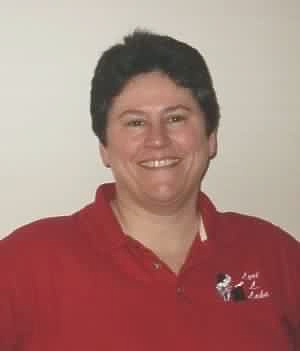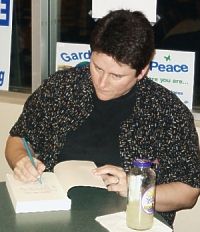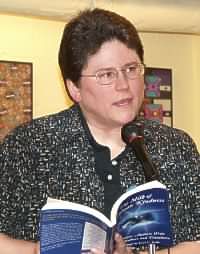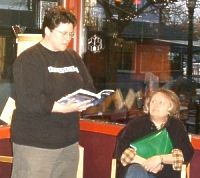
Helpful Hints |
|
|
I had my first ever bookstore reading near the end of 2001 at Amazon Feminist Books in Minneapolis and learned a lot of things from it. I was nervous as hell at first, but after the store organizer introduced me, I jumped right in to reading from GUN SHY, and somehow, reading calmed me down. The place was packed, largely because I invited everyone I knew, but also because the store had sent out a flyer with a little picture of me and a description of the books. There were many, many familiar faces in the audience (which was a comfort) and a whole bunch of strangers (which was a thrill). Check Bookstore Space and Supplies Now that I have had many more readings over the years, I have developed a lot of ideas and suggestions. First, how big is the shop in terms of space? Is there room for 50+ people? Do they have 50 folding chairs? You've got to have seats or people won't stay for the 60-90 minutes that you are going to read and chat. Secondly, if possible, it is helpful to be miked. It makes it easier for the listeners (especially if you have octogenarians there like I did!), and your throat will appreciate the fact that you don't have to read 7-10 pages of your book while trying to project your voice. If they have good acoustics and are a small tight shop, then it might not be such an issue, but remember that books soak up sound. Bookstores tend to have muffled acoustics. At Amazon Feminist Books in Minneapolis, it didn't help that they had a coffee bar there, so every time they started up the grinder or mixer (or whatever coffee types use that makes that gawdawful racket) it would have drowned me out had it not been for the mike. Next thing, do they have a lectern? That is helpful in terms of holding your book, though it *can* separate you from the audience if it's a big ugly thing. They gave me a music stand--one of those black, pull-up things. I ditched that after about half a page because my books are so dang heavy that they caused it to s-l-o-w-l-y descend. I just held the book after that. Timeline Can you stand for 60-90 minutes? Take a look at this timeline of my reading. (Yes, we kept track because Diane and I are keeping a folder of info so that we can get this down to an art): = 5:45 Arrived at the store and checked in with the organizer, then sat in the coffee area and talked to various fans who had showed up early as me (crazy people, that is!)Now, I tell you all this because doing a reading is exhilarating, but also a bit wearing. If you can't stand for about 2.5 hours, then make sure you have a tall stool to sit on. I found it easier to stand holding the book while I read. For some reason, sitting wasn't as comfy for me (I think I'm too nervous), but everyone is different. Signing
Advertising Don't be shy or feel like you are imposing on the bookstore or its personnel. The bookstore OUGHT to be begging you to come do a reading! All of us authors should be being begged regularly to do readings. We can make some big money for bookstores if they will help us get the word out. Once you get to know bookstore people, it can be a very useful relationship for all involved. Does the shop have a newsletter? They need to feature you and your book prominently in advance and then afterwards. Be sure to send them info in advance, and when you are there that night, if there is any other follow-up information you can furnish them with (making a pointed suggestion that they put it in their newsletter), then do it. If they don't have a newsletter (either online or by mail), can you (or they) create a one-page flyer? It helps if a photo of you and/or your book is on it, a description of the story, maybe some blurbs/testimonials. If you could actually get someone firmly established (you know, big names in the biz) to write a blurb, that would be even better, but if you aren't lucky enough to know someone famous, you can surely get one of your peers from your publishing company. Then take the flyer out and paper the town. Post it in other bookstores, coffee shops, the local men's or women's center, the PFLAG newsletter, NOW, open-minded churches, and any women's or gay and lesbian organizations you can think of. Send a press release to www.gaywire.com, and send releases to every single paper in the region--both gay and straight (not the fundamentalist nitwits, of course). Promotion If your press has a promotions person, get with that person to figure out what the press can do to help get the word out. I know it all sounds a bit overwhelming, and you end up feeling like a shameless huckster, but *somebody* has to do this to get the buzz started, and a lot of it falls on you, the author. Write the releases and the newsletter as an announcement from the POV of the bookstore. That makes me feel less uncomfortable than something that says, "Hey, I'm reading, and I beg you to come." Instead, it's more like, "THE XYZ GLBT Bookstore is thrilled/pleased/proud/excited (you pick) to host a book reading and signing by the talented new lesbian author Your Name Here!!!" And then a bunch of gushing - but true - stuff needs to follow to really excite and sell. Take a crack at it, and if you can't quite gush enough about your writing, then send it around to your writer buddies to help you spiff it up. Okay, so now you have the place set up, you have advertised, you have called to invite your entire clan of relatives, and you contacted every single colleague, acquaintance, and friend you know, including every softball team, basketball team, judo/karate organization, hair stylist buddy, dance/yoga class, old college friends, other nearby authors, etc. Ask other authors if they will post a blurb on their sites. Three people actually showed up to my first reading and said, "MaryD (a Xena site owner) told me to say HI." Can you advertise at your work or at the workplace of friends who have GLBT organizations? Don't be shy about this. Here's what I have found: People Love To Know Someone Who Has Published A Book. There's some sort of strange mystique about it - there must be because otherwise, why would two 70+-yr-old straight women, one 84-year-old who can't even spell lesbian, and one 54-yr-old religious zealot buy my books at that first reading? People get excited about this sort of thing. The Reading What you read is important. Pick your scenes and PRACTICE reading them. Time how long it takes. Make yourself read slowly, with measured tones. Don't race through - take it from me - the original racer! People want to understand you! Make yourself read slowly. Designate someone to sit in the front row and remind you with hand gestures slow down if you seem like you're rat-ta-tatting. Due to nerves, you will be reading along at the rate of a cattle auctioneer. You want to make sure you don't do that. Also, HAVE A VERY LARGE BOTTLE OF WATER THERE and drink from it regularly. The audience will wait. They'd rather *understand* you than hear a dry, rasping, tongue-stuck-to-the-roof-of-your-mouth blather. And there is nothing more stressful than suddenly finding all the moisture in your mouth has disappeared. Remember to sip frequently.
So you will read a long piece / Q & A / read a short piece / Q & A / Wrap up, and move to the signing. Q & A Advice Now here's the most critical thing about Q & A...if you want it to work, you need to plant a few questions in the audience. (Oh, I know, it sounds so manipulative, but BELIEVE ME, you will be so incredibly glad you did it!). Most people tend to be shy, and after a scene is read, they sort of sit there, looking at you blankly. YOU, as the author, need to think, "What is the first logical question about this scene that any idiot should think of?" Then give that question to one of your best buds and ask him/her to pop right up with that question. The audience then gets engaged with your answer, which you will also have already thought of in advance so that your first answer can sound suave and polished as though you are just the smoothest, smartest, most interesting person on the planet—as opposed to the quivering jellyfish that you, yourself, are currently certain you have become. After one—or maybe two—planted questions, the audience will usually emerge from their dull torpor, and you ought to get some others. Still, your other friends in the audience have to be prepared for any other lag. When the questions stumble to a halt, a friend pops up with another insightful question allowing you to be witty, charming, and entertaining, and that will either prompt more Q & A or signal time for you to do your second reading. You should get 10-15 minutes worth of Q & A, and actually, even if they are engaged, after 15 minutes, you want to read your second selection, even if they still want to ask questions. They'll get a second chance, so don't feel bad if you don't get them all first round. Read your second selection, then go through the same cycle again—though the audience may now be pretty comfy with you and everyone else sitting around them, and your friends may not have to ask questions at all. You don't want a lot of dead time, though, so try to keep the repartee going. Wrap Up When it seems like everyone is satisfied and no more questions are coming, you do a wrap up. Publicly thank the bookstore people - by first name if at all possible and loud enough so they can hear. (After the first reading where I forgot to thank everyone, I started keeping an index card in my pocket so I could write down names and any sponsors or helpers. Pull that out to refresh your memory—a real relief if you are feeling scattered). If you want, have the audience give the people you thank a round of applause. Thank anyone who helped you with flyers or who was instrumental in making this work. Thank your family, friends, fans, and assorted strangers for coming. Go on and gush about how wonderful the audience was, and just generally let the grace of the Universe wash through you (which it will because you'll be so flippin' grateful you didn't fall over or pee your pants or embarrass yourself in whatever way you worried you would). Then you say something like, "Let's knock off now, and if any of you want me to sign your book, I'd be more than happy to do so. If you didn't get one yet, Name of Clerk over there at the register has them for sale. Also, I have bookplates for those of you who didn't bring your book along." It's always useful to have some bookplates on hand and hand them out liberally. You never know when someone will decide to buy a gift later for a friend. Have an Enforcer Then you'll be mobbed with excited, happy people. Keep your head about you. Be patient. Don't rush. People are almost always aware that you have limited time, so most of the time they are pretty respectful. Just sign and chat as steadily as possible. It is very helpful, however, if you have an Enforcer standing by—a friend or bookstore person—to intervene if you get the inevitable Boor up there—someone you have never met in your life and who usually doesn't intend to buy the book—who wants to blah-blah-blah on and on. The Enforcer can take stock, and if someone is holding up the line past his or her allotted two to three minutes, s/he steps in and says to you, "Ah, Name of Author, you really need to move on, dear. There are still _X_ people waiting..." Then you get to look apologetically at The Boor and say, "I'll talk with you more about this at another time, okay?" You reach up for the next person's book and move on. Also, I told my close friends to wait 'til last and let the strangers and acquaintances be in line first. And actually, I had already signed books for a lot of my friends, so that was in some cases a moot point. Thank goodness for understanding friends! How Many Books to Bring If the bookstore hasn't purchased your books, and you are bringing them yourself, let's talk about how many to bring with you: Bring as many as you can afford within reason. I sold 15 GUN SHY + they had to order a few more for people who didn't get them. They sold 23 RICOCHET. I had already sold books to a lot of my friends, and many people had ordered them already online and brought them in for signature. Still, the 50+ people at the reading bought a total of 38 books plus several orders.
See if the bookstore will give you your own little end-cap near the front of the store and prominently feature the book. If you have some left over, send them to reviewers or to other bookstores or even as Christmas presents to folks you don't ordinarily send gifts to. Oh, one more thing about the actual reading: Have someone come and take photos. You won't notice the flashes much. But if you can get at least one good photo for future marketing, it will be well worth it. You might want someone shooting B/W and someone shooting color. It would helps so much for marketing purposes. You could even use one on the back cover of your next book. Customer Hand-Outs Did you make bookmarks? How about bookplates? If not, get a .jpeg image of the cover and make some. I can't tell you how excited people get about this!! They just go ga-ga. You may also want to make some data sheets to leave lying around if you haven't already. Good ideas for things to have at your table include: = summaries of your book(s) (a data sheet is great-most publishers will provide one for you to copy)Make Notes and Share Them When you are all done and sitting around processing what happened with your loved one(s), make notes. What went well? What didn't? Put it down on paper while it is still fresh in your mind and file it in a special file you can easily find. Then next time you prepare to do a reading, get out that file and go over your notes. Figure out what you forgot, what you want to do differently, etc. Lastly, share your successes and observations with other authors, particularly those who are new at it. It makes it less intimidating if they can hear what went right as well as what went wrong. We are all learning about this process, and anything you can pass on to help others will only come back to help you later! Let me also say that it helps immensely in terms of less stress and more fun if you invite other authors to share the stage. Nearly half the appearances I have done have been with one or more other authors. You can have a lot of fun with that. Happy Reading! _____ © Lori L. Lake, 2006 Back to Article Archive. |
 |



